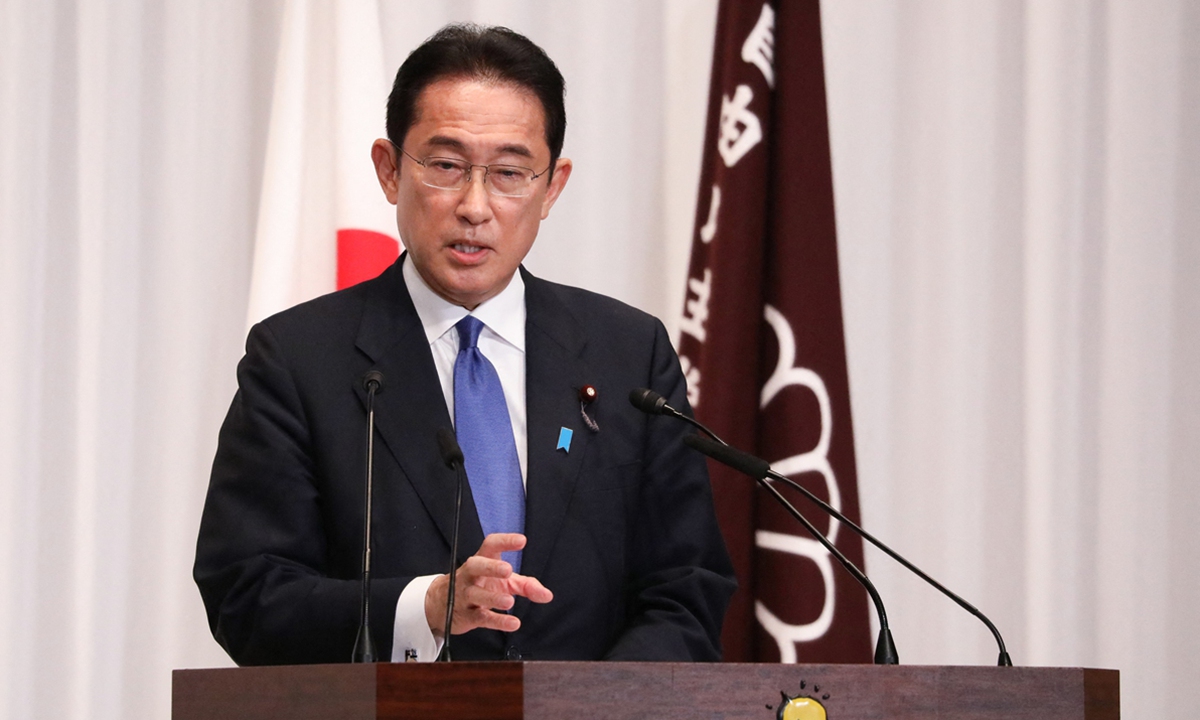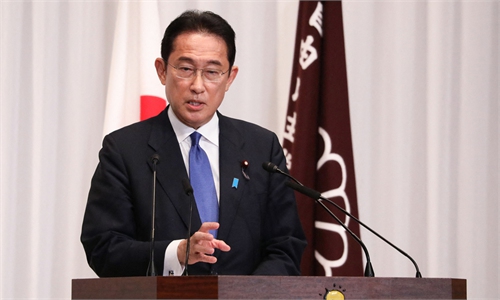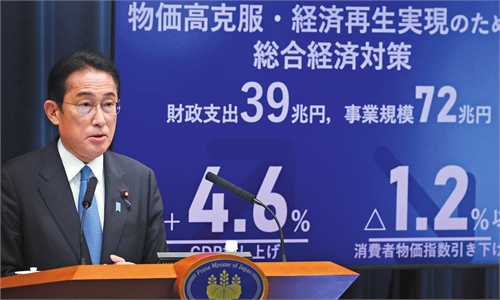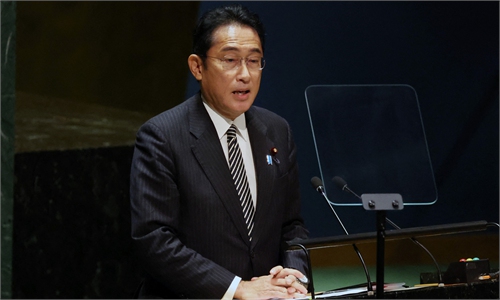Fragile Kishida cabinet may speed up constitution amendment to gain support, but move will either be bargaining chip or bomb: observers

Fumio Kishida Photo: AFP
Japanese Prime Minister Fumio Kishida has denied he was thinking of reshuffling his cabinet in coming weeks despite plummeting public support over a series of scandals, but Chinese observers believe that the Japanese administration, which has been hyping so-called external threats and trying to free itself from its military restrictions, is likely to speed up amendments to the constitution to gain support from conservative forces.
However, observers warned that the potential move will either be a bargaining chip for the cabinet or lead to a backlash from the public amid the country's highest inflation in decades.
Kishida's support has tumbled to its lowest level since he took office in October 2021, and he has been trying to repair the damage after a series of scandals forced him to replace three ministers in the space of a month, Japan Times reported on Thursday.
For example, Kishida made the decision to oust internal affairs minister Minoru Terada on Saturday given increasing pressure within his party to lessen the impact on the upcoming parliament session on the second extra budget for the fiscal year through March and will discuss the procedures with aides on Sunday, Yomiuri said.
Terada has come under fire for several funding scandals and has acknowledged that one of his support groups had submitted a funding documentation ostensibly signed by a dead person, and calls have risen for his departure ahead of budget deliberations set to start this week, Reuters reported.
A poll published by broadcast news network ANN on Monday found support for Kishida's cabinet had fallen 2.6 percentage points to a new low of 30.5 percent, according to media reports.
With an extraordinary three cabinet resignations in just the past month, Kishida may be facing the difficult question of whether he has the skill to run a government, Mainichi Shimbun said in an editorial article.
As the cabinet ministers fall like dominoes, so too does public trust, and Japanese society is concerned about whether the next domino to fall will be the prime minister himself, observers said.
Kishida, who spoke to reporters Thursday, denied domestic rumors that he was thinking of reshuffling his cabinet in the coming weeks, according to the Japan Times.
But the possibility of a cabinet reshuffle cannot be ruled out, Da Zhigang, director of the Institute of Northeast Asian Studies at the Heilongjiang Provincial Academy of Social Sciences, told the Global Times on Thursday.
Though he does not need to face another election for more than two years, sagging approval ratings make it more difficult for Kishida to control his party and push policy pledges through parliament, including an increase in defense spending, Japanese media said.
Problems such as the cabinet crisis, rising consumer prices and the COVID-19 pandemic are piling up, which could force Kishida to reshuffle his cabinet for the second time, making his future in power uncertain, observers said.
If the cabinet persists in its inability to win back public trust, Kishida shaking up the cabinet and the executive lineup of the ruling Liberal Democratic Party (LDP) in early 2023 is still possible, Da believed.
In order to resolve the crisis and deflect domestic contradictions, Kishida is actively catering to right-wing conservative forces, playing up the so-called "external security threat" to stir up the public's sense of crisis, and accelerating the promotion of aggressive issues such as strengthening "independent defense" capability, observers noted.
In diplomacy, Kishida has used multilateral occasions such as G20 and APEC meetings to demonstrate his diplomatic skills by interacting with major powers the US, China and Europe.
But at the same time, some Japanese politicians are keen to incite and cater to the anti-China trend and compete to show their strength to the outside world. The ruling and opposition parties lack diversified policy debates on foreign and defense issues, and many of them advocate revising the constitution, strengthening the military, and improving the Japan-US alliance, while no one puts forward constructive propositions on how to break the country's diplomatic predicament, which is pushing Japanese politics into a narrow cul-de-sac of national conservatism, Chinese observers pointed out.
Given the forces in favor of amendments to the constitution are growing stronger, Kishida may hype the sensitive issue and speed up revising the country's pacifist constitution in order to gain more support among conservative forces and maintain his influence in the LDP, Da warned.
The result of Japan's upper house election in July showed that forces advocating constitutional amendments obtained more than two thirds of the seats, passing the threshold required for starting the process of constitutional amendments.
However, Da warned that the potentially dangerous move could either be a bargaining chip or a bomb for Kishida. If he tries to push forward the constitutional amendments and unleash Japan's military development, which will be costly in manpower and money and too unrealistic in the short term, at a time when the country is facing its highest inflation in decades, the administration will face a backlash from the public and have no hope of gaining the people's support on policy implementation.




